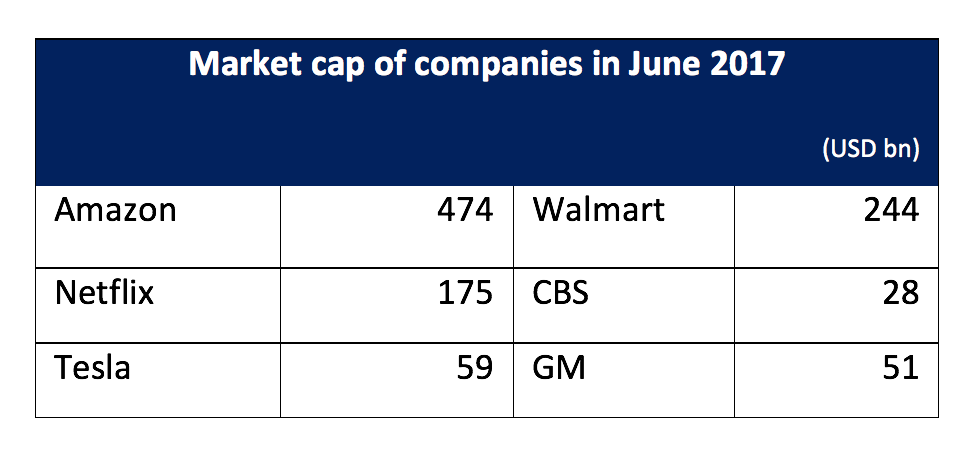Look at the table below. What do the three companies on the left – Amazon, Netflix & Tesla – have in common?

Yes, all three have greater market capitalisation than those on the right. But another commonality is that all three are newer companies, attempting to disrupt and dislodge the older players on the right. How? As ‘data companies’.
They are, respectively, a data company serving retail, a data company serving media and a data company helping address your transportation needs. These data-driven companies are a force to be reckoned with, fearlessly leveraging the power of data and analytics to reimagine businesses and their value propositions. So, what’s their secret?
Amazon, Netflix & Tesla leverage data to build new monopolies
First, these companies are based on a business model designed to leverage the ‘data network’ effect. This essentially refers to a growth cycle in which data and data-driven services are used to acquire customers. Those customers, in turn, create more data that is analysed and acted upon to improve services, which ultimately attracts more customers.
While the business models of these companies differ to some extent, they are all effective because they have the data-network effect at their core.
Building a defensible business model: talent, culture and investment
A business model is hollow without the people and data that drive it, which is why these big brands strive to incorporate incredible talent within the company, cultivate a culture that facilitates this and make investments that allow them to harness different types of data.
The world’s biggest brands frequently over-invest time and resources to ensure that the best people are brought into the company. However, attracting these people to the company is important. Culture defines a company.
As Amazon CEO Jeff Bezos put it: “I knew that if I failed I wouldn’t regret that, but I knew the one thing that I might regret is not trying.” These companies don’t settle for a sub-par culture. It is also one of the primary elements of a solid and defensible business model. They test, learn, fail and, eventually, succeed.
Another area where these companies clearly take the lead is in investment. Amazon passed Volkswagen AG late last year to become the world’s biggest corporate spender on R&D with more than $US17 billion spent in the preceding 12 months alone.
This has been directed at harnessing data and artificial intelligence-driven applications, through capturing, synthesising, predicting, nudging and developing intelligence around rapid real-time flows of large unstructured data (e.g. some estimate a self-driving car generates 100 gigabytes of data per second).
Speeding things up for a better customer experience
All these changes and developments are occurring at an unprecedented pace. Driven by the rise of automation, many processes of production and delivery are happening faster than ever and pushing levels of productivity up.
This also means that these companies can understand their customers and deliver on their promises more effectively to improve the customer experience. In effect, data and automation have enabled improved processes and experiences both internally and externally.
Amazon, Netflix, Tesla, and the like are demonstrating that data has been, and will continue to be, the driver of growth and change in the future. The secret behind the world’s biggest brands is hardly a secret any more, and will create significant shifts in value capture for companies.
The data-network effect is the new growth model for business – fill your organisation with the right people, culture and resources to be in the running with the world’s biggest businesses.





